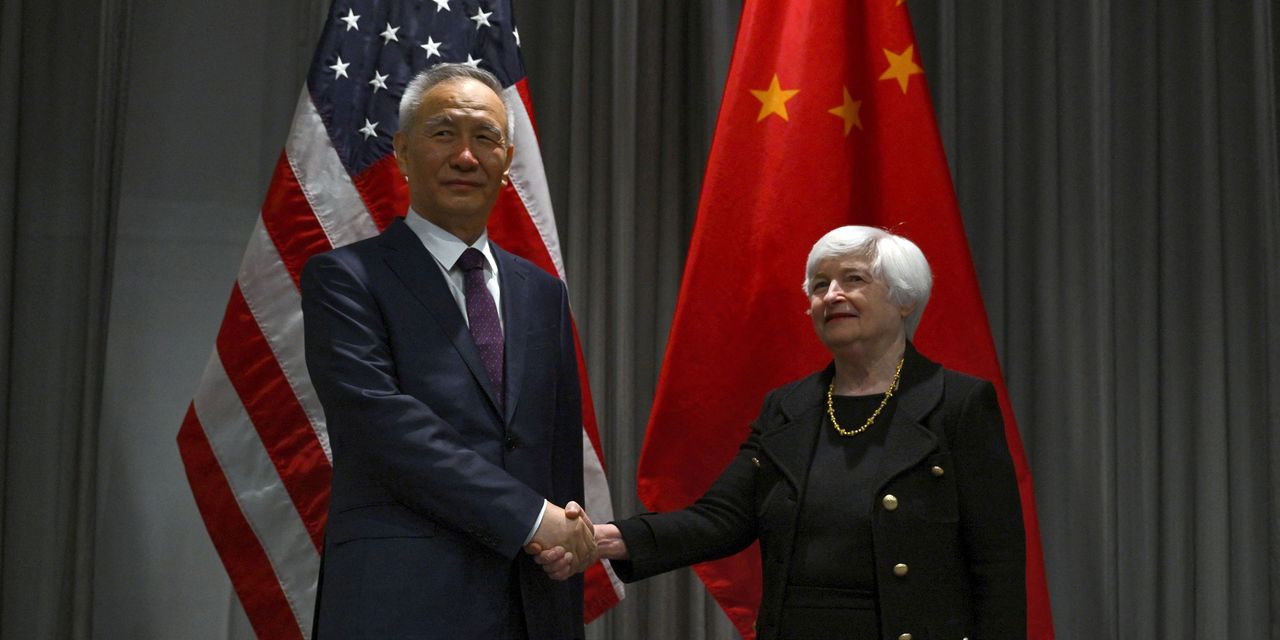About the author: Susan Thornton is a retired U.S. diplomat and former acting assistant secretary of state for East Asia and Pacific affairs. She is currently a senior fellow at the Paul Tsai China Center at Yale University Law School.
Treasury Secretary Janet Yellen is traveling this week to China for crucial discussions between these two huge economies. She will have much to discuss, with markets in a state of unease and global growth stalled. But the most important aspect of the trip may simply be that it is happening at all, after months in which the two world powers seemed barely able to communicate with each other.
A trip last month to China by Secretary of State Antony Blinken helped stabilize relations both by opening a dialogue with Chinese counterparts and by opening a diplomatic path along which other communications can follow. It was long overdue. When Blinken arrived in Beijing in mid-June, it had been almost five years since the top U.S. diplomat was in Beijing, due both to Covid-19 and the deteriorating relationship. In Blinken’s words, the meeting aimed to show that the two sides “can responsibly manage their competition.” As such, President Xi Jinping’s constructive meeting with Blinken was a positive signal. This is the lowest of low bars, but clearly a necessary first step in getting much-needed U.S.-China diplomacy restarted.
The Blinken visit was originally to have happened in February, when the appearance of a Chinese surveillance balloon over Montana caused it to be postponed. Some critics asserted that the rescheduled visit projected U.S. weakness, but nothing projects insecurity more than a refusal to meet. Holding back diplomatic engagement is a tactic often employed by the disadvantaged side, like when officials in Pyongyang or Tehran balk at meeting their U.S. counterparts. Meetings between these two world powers clearly need to be regular and should not be seen as a bargaining chip.
The U.S. economy is showing a strong post-pandemic recovery. That puts Yellen in a good position to coordinate with Chinese counterparts on macroeconomic and other specific concerns, like developing country debt. The Chinese economy is facing headwinds, due mainly to structural domestic issues but also in part due to a deteriorating international environment. With China’s growth contributing as much as one-third of global growth in recent years, China’s troubles will have wide ripple effects.
The Biden administration has adopted the rhetoric of “de-risking” toward the Chinese economy, as have U.S. allies in Europe and Asia. Yellen can hopefully explain to her Chinese counterparts how this concept will be narrowly targeted at advanced military goods and won’t lead to a wider Cold War. Even with the ongoing “trade war” and Trump-era tariffs still in place, U.S.-China trade reached a record $700 billion last year, while China’s share of global manufacturing reached a new high of 31% percent in 2022. Yellen and her counterparts will also presumably discuss pending curbs on U.S. China-bound investment, their purpose and scope. These will be tough conversations, but we must hope that the meetings manage to project confidence and stability, as global citizens are buffeted by shocks and feel increasing pessimism about their economic futures.
Detractors will likely claim that Yellen’s visit is a mistake, that meeting with the Chinese is either a carrot to be withheld or a waste of time. Neither claim is valid. Withholding engagement from the second largest economic power in a globalized world only disadvantages the U.S. China has been playing host to a parade of world leaders, continues to grow its overseas foreign direct investment, and has overtaken Japan as the world’s largest car exporter. We cannot afford to just ignore China.
Differences over Taiwan are the source of greatest military tension in U.S.-China relations. Avoiding a potentially dangerous crisis requires that the U.S. and China maintain not only crisis communication, but continual contacts. Secretary Blinken discussed this issue at some length during his meetings, but Chinese officials have said that military-to-military contacts cannot take place while China’s defense minister is under U.S. sanctions. The U.S. sanctioned Li Shangfu in 2018 in connection with his role as the lead Chinese defense procurement official for purchasing military goods from Russia. Li was named defense minister in March. It is not clear how this standoff will be resolved, but continuing refusals to meet will make things worse.
One initiative that would help is renewal of the U.S.-China security discussions that were formerly held with both civilian and military participation. Led by the State Department and focused on diplomatic coordination, these talks focused on arms control, doctrine, cyber and space, but also allowed the two militaries to air concerns about regional security issues like Taiwan and the South China Sea. As diplomacy between the U.S. and China is rebuilt, such discussions can build needed confidence for crisis management and direct military-to-military contacts.
There is clearly a common interest and intention on the part of both the U.S. and China to avoid what would be a catastrophic military conflict. As tensions continue to escalate, however, conflict becomes more likely. We know given the myriad challenges ahead that tensions will remain and that the best, and perhaps only way to keep them in check is to talk. Let’s hope that these U.S.-China contacts can go forward and multiply.
Guest commentaries like this one are written by authors outside the Barron’s and MarketWatch newsroom. They reflect the perspective and opinions of the authors. Submit commentary proposals and other feedback to [email protected].
Read the full article here





